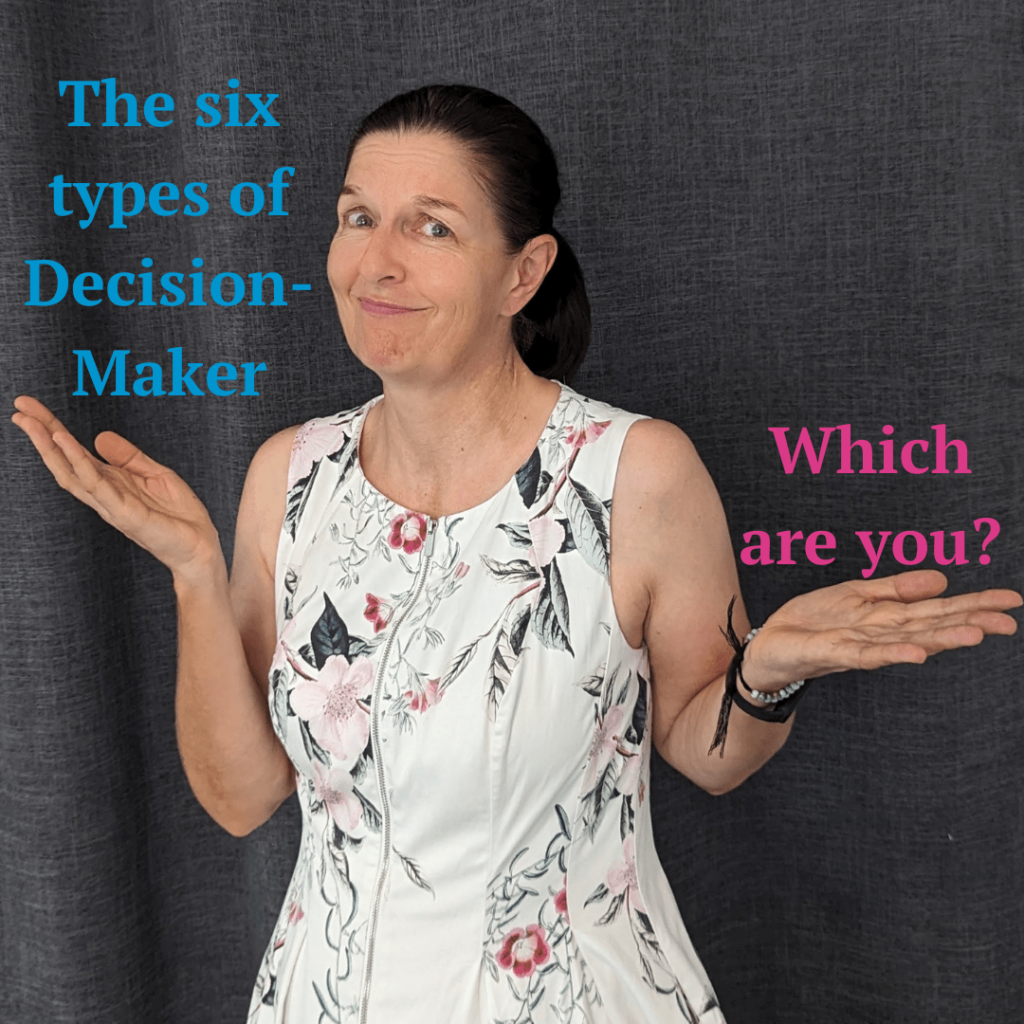
Your Introduction to Decision-Making Styles
Hello there! Whether you’re leading a team, working alongside others, or simply navigating the twists and turns of life, your decision-making style plays a huge role in how you show up and succeed.
Have you ever stopped to think about how you make decisions? Maybe you’ve wondered why some choices come so easily while others feel like climbing a mountain. Well, you’re in the right place to find out.
As a leader — or even as a team player — knowing your decision-making style isn’t just helpful; it’s essential. It can transform the way you lead, collaborate, and approach challenges, both big and small. And here’s the fun part: you don’t have to guess.
I’ve put together a quick quiz to help you uncover your decision-making style. In just a few moments, you’ll gain insights that can sharpen your decision-making skills and deepen your understanding of others around you.
The Power of Knowing Your Decision-Making Style
Imagine this: you step into a challenging situation, but instead of second-guessing, you handle it with clarity and confidence. Why? Because you understand exactly how you make decisions — and that insight changes everything.
When you know your natural approach to decision-making, it’s like discovering a hidden superpower. Whether you’re the go-to intuitive problem-solver, the analytical strategist, or the team’s collaborative glue (a democratic decision-maker), knowing your preferred style will help you play to your strengths. You’ll approach decisions with greater focus and less stress, making the process feel smoother and more rewarding.
But here’s where it gets even better…
Understanding your decision-making style doesn’t just benefit you — it also transforms how you work with others. When you recognise how you and your team approach decisions, you create opportunities for clearer communication, stronger connections, and more meaningful discussions. I have also seen leaders who adapt their decision making style to fit the situation and reflect the needs to the team they are working with — now that’s leadership at it’s best.
That’s the true power of knowing different decision-making styles: fostering a culture where everyone’s input is valued and diversity of thought leads to better, more innovative solutions.

Decision-Making Beyond Boundaries
Decision-making isn’t just a workplace skill — it’s woven into the fabric of everyday life. From navigating tricky family dynamics to making plans with friends or resolving a disagreement with your partner, understanding your style can make all the difference.
When you know how you approach decisions — and can appreciate how others do too. That means you’ll open the door to better communication, smoother conflict resolution, and deeper, more meaningful connections with the people who matter most.
So, here’s the next step. Before we dive into the fascinating world of decision-making styles, why not uncover yours?
It only takes a moment, and this quick quiz will give you the insights to start making more confident, harmonious decisions — in all areas of your life.
Haven’t taken the quiz yet? Then it’s time to take the quiz now!

Understanding your Quiz Results – The 6 Decision-Making Styles
Now that you’ve completed the “Discover Your Decision-Making Style” quiz, let’s take a closer look at what your result means. Understanding your style gives you the key to making more confident and effective decisions, both in your leadership role and as a team member.
If you found that you have a mix of styles, that’s something to celebrate! Being able to switch between different approaches based on the situation is a powerful leadership skill. It shows your flexibility and your ability to adapt to the needs of your team and environment.
Let’s break down the six main decision-making styles, so you can see what each one brings to the table:
‘A’ Answers: Autocratic Decision Maker
If you’re an autocratic decision-maker, you tend to make decisions independently, trusting your own expertise and intuition. You’re quick, assertive, and prefer to take charge, making decisions on your own without seeking extensive input. This style allows you to move decisively and get things done fast. Embrace this strength — it’s your superpower when results matter and time is of the essence.
‘B’ Answers: Democratic Decision Maker
Democratic decision-makers thrive on collaboration and inclusivity. You actively seek input from others, valuing diverse perspectives and ensuring everyone’s voice is heard. This approach fosters strong teamwork and leads to well-rounded, thoughtful decisions. By embracing this style, you create an environment where everyone feels involved and valued, which drives innovation and shared responsibility.
‘C’ Answers: Consultative Decision Maker
If you identify with the consultative style, you value gathering opinions and insights from others but retain the final say. You balance input from your team with your own judgment, making decisions that reflect the best of both worlds. This style builds consensus and encourages buy-in, while still allowing you to maintain control and make well-informed choices.
‘D’ Answers: Consensus-Driven Decision Maker
As a consensus-driven decision-maker, you prioritise achieving unanimous agreement within your group. Collaboration and open communication are key, as you work to ensure everyone’s perspectives are considered. This approach fosters inclusivity and shared responsibility, creating a culture of cooperation and mutual respect. Embrace this style to build stronger, more cohesive teams.
‘E’ Answers: Intuitive Decision Maker
Intuitive decision-makers rely on their gut feelings and past experiences to make quick decisions. You trust your instincts, often making choices based on subconscious insights rather than deliberate analysis. This style allows you to tap into your inner wisdom and make confident decisions in fast-paced or uncertain situations. Trust your intuition — it’s a powerful tool for navigating complex scenarios.
‘F’ Answers: Analytical Decision Maker
If you’re an analytical decision-maker, you thrive on data, logic, and objective reasoning. You take your time to gather information, weigh alternatives, and make decisions based on evidence and facts. This style ensures thoroughness and accuracy, making you an expert at tackling complex problems with a rational, methodical approach. Embrace your analytical strengths to make well-informed, data-driven choices.
Understanding the Six Decision-Making Styles: Gain Insights into Your Own Style and How Others Make Decisions
Now that you’ve gained an insight into your unique tendencies let’s further unravel the meaning behind your style AND explore the fascinating world of other people’s decision-making styles.
Understanding both your own style and those of others will empower you to approach decision-making scenarios with confidence, collaborate effectively, and foster greater inclusiveness when working with individuals who have different styles than yours.

Style: Autocratic decision-makers make decisions independently, relying on their own expertise and judgment.
Typical phrases or expressions you may hear: “I have made the decision,” “I know what’s best,” “I don’t need anyone else’s input.”
Additional traits: Autocratic decision-makers exude confidence and often have a decisive and assertive communication style. When engaging with an autocratic decision-maker, presenting well-reasoned arguments with supporting evidence can influence their decision-making process.
Understanding and Interacting: To understand and interact effectively with an autocratic decision maker, acknowledge their confidence and decisiveness. When presenting your ideas, provide solid reasoning and demonstrate how your suggestions align with their goals. Respect their need for independence while also expressing your willingness to support the final decision.
Democratic Decision Maker
Style: Democratic decision-makers value input from others and actively seek participation in the decision-making process, aiming for consensus or majority agreement.
Typical phrases or expressions you may hear: “Let’s hear everyone’s thoughts,” “What do you think about this?”, “We need to reach a decision together.”
Additional traits: Democratic decision-makers excel in collaboration, fostering open discussions and embracing diverse opinions. When working with a democratic decision-maker, be prepared to actively contribute your ideas and engage in constructive dialogue to help shape the final decision.
Understanding and Interacting: To understand and interact effectively with a democratic decision-maker, appreciate their inclusive approach and willingness to consider different perspectives. Engage in open and constructive discussions, ensuring that your ideas are heard and respected. Embrace the opportunity to collaborate and work collectively towards a well-rounded decision.


Consultative Decision Maker
Style: Consultative decision-makers seek input and advice from others while retaining the final decision-making authority.
Typical phrases or expressions you may hear: “I value your input,” “Let’s discuss this together,” “I will consider your suggestions before deciding.”
Additional traits: Consultative decision-makers skilfully gather diverse perspectives, promoting an inclusive decision-making process. When collaborating with a consultative decision-maker, ensure you provide well-thought-out insights and actively engage in discussions, knowing that your input is valued and taken into consideration.
Understanding and Interacting: To understand and interact effectively with a consultative decision maker, recognise their desire to seek input from others while maintaining the ultimate responsibility for the decision. Be prepared to offer well-reasoned suggestions and engage in meaningful conversations, as your input contributes to shaping the final outcome.
Consensus-Driven Decision Maker
Style: Consensus-driven decision-makers strive to reach a unanimous agreement among stakeholders through open dialogue and collaboration.
Typical phrases or expressions you may hear: “Let’s work together to find a solution,” “Can we all agree on this?”, “We need everyone’s support to move forward.”
Additional traits: Consensus-driven decision-makers facilitate group discussions and focus on finding common ground among differing viewpoints. When engaging with a consensus-driven decision maker, be prepared to contribute to the collaborative process, actively seek areas of agreement, and work towards finding mutually acceptable solutions.
Understanding and Interacting: To understand and interact effectively with a consensus-driven decision maker, embrace their commitment to finding unanimity among stakeholders. Actively participate in discussions, demonstrate willingness to compromise, and work towards solutions that benefit the entire group. Respect the value placed on inclusivity and collaborative decision-making.


Intuitive Decision Maker
Style: Intuitive decision-makers rely heavily on instincts, gut feelings, or personal experiences to make decisions quickly.
Typical phrases or expressions you may hear: “Something tells me,” “I have a hunch that,” “My instincts are guiding me to…”
Additional traits: Intuitive decision-makers possess keen perceptions and trust their inner voice, often making swift decisions in dynamic situations. When interacting with an intuitive decision maker, be open to their insights and trust their ability to navigate uncertain circumstances based on their intuition.
Understanding and Interacting: To understand and interact effectively with an intuitive decision maker, respect their reliance on instincts and gut feelings. Be receptive to their insights and acknowledge the value of their quick decision-making. While offering rationale and supporting data can be helpful, also appreciate the importance of trusting their intuitive leaps.
Analytical Decision Maker
Style: Analytical decision-makers emphasise data analysis, systematic evaluation, and logical reasoning in their decision-making process.
Typical phrases or expressions you may hear: “Let’s examine the data,” “What are the pros and cons?”, “We need to consider all the facts before deciding.”
Additional traits: Analytical decision-makers are meticulous in their approach, carefully considering information and exploring all possible options. When working with an analytical decision-maker, be prepared to provide relevant data and logical arguments to support your recommendations.
Understanding and Interacting: To understand and interact effectively with an analytical decision-maker, acknowledge their reliance on data and logical reasoning. Provide well-organised and comprehensive information to support your proposals. Recognise their need for accuracy and thoroughness and be prepared for in-depth discussions that scrutinize various aspects of the decision at hand.

Learn Which is the Best Decision-Making Style
Keep an eye out for my upcoming blog ‘Choosing the Best Decision-Making Style: Tailoring Your Approach for Business Success.” In it I’ll answer questions like “What is the best decision-making style for business?” and “what’s the best decision making style for leading a team?”
Want to take more quizzes?
Check out a range of Career and Life Quizzes I have created for you here. And if you have a quiz you’d like me to create please do get in touch.
Free Clarity Call
If you’re interested in booking an obligation-free chat with me, simply click the button below.
I look forward to helping you achieve greater clarity and success in your life and career and the job satisfaction you deserve.
Please click the button below if you’d like to book an obligation-free chat with me.

Leave A Comment